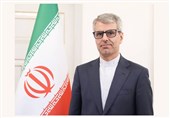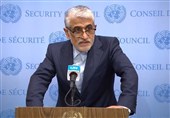UN Body Condemns Australia for Illegal Detention of Asylum Seekers, Refugees
TEHRAN (Tasnim) - A key United Nations body has condemned as arbitrary and illegal Australia’s indefinite incarceration of refugees and asylum seekers, issuing critical statements on five separate cases in a year.
But those unlawfully held remain in indefinite detention, where they have been held for up to nine years without charge.
The working group on arbitrary detention is a key part of the UN’s Human Rights Council, on which Australia now sits after a years-long public and diplomatic campaign for the position.
The working group is an independent body of human rights experts that assesses cases of alleged arbitrary detention and reports to the council, The Guardian reported.
Since June of 2017 the arbitrary detention working group has published five opinions critical of Australia’s open-ended detention of asylum seekers and refugees. It has consistently argued Australia’s indefinite detention of some refugees and asylum seekers is unlawful.
In each of the five published opinions, the working group has recommended Australia immediately release the men held and pay them “compensation and other reparations” for their unlawful detention.
None of the men have been released. The youngest is 29 years old, the oldest 45. They each face detention without charge – in theory, potentially until the end of their lives.
The longest in detention is an Afghan asylum seeker, who has been held in Australian detention centres continuously since 2009.
His claim for protection has been rejected but he still has appeals before the courts, and his case has been complicated by the Australian government leaking his personal details online, potentially compromising his safety in his home country.
Stateless Western Sahara man Said Imasi has been held without allegation, charge, or trial for more than eight years since he arrived in Australia by plane as a teenager in 2010.
His case is set to go before the high court this year, brought by Human Rights for All.
Others represent complex cases, where Australia’s obligation under international law to offer protection refugees is in conflict with adverse “character assessments”, mental health issues and domestic legal requirements to cancel visas.
In one case, a former child soldier from the Sudanese civil war brought to Australia as a teenage refugee 15 years ago, and who has ongoing and acute mental health issues, has been convicted of 40 criminal offences and had his visa cancelled after two warnings.
The government has cancelled his visa on character grounds but cannot send him to any other country in the world. He faces a potentially indefinite detention.
Also currently being assessed by the arbitrary detention working group is the case of a stateless child refugee, revealed by Guardian Australia this week, who was brought to Australia by boat as a 16-year-old and who remains in immigration detention after five years – he is now an adult – and facing a potentially limitless incarceration.
The arbitrary detention working group has consistently condemned Australia’s reliance on indefinite detention.
In several cases, the open-ended detention has also been criticized by Australia’s own commonwealth ombudsman. In the case of Said Imasi, the ombudsman has said it has been recommending for six years he be released into the Australian community but “there appears to be no clear resolution in sight”.
The Australian government has defended its policies, arguing before the UN working group that its detention regime “is administrative in nature and not for punitive purposes” and had succeeded in stopping the flow of asylum seeker boats to Australia.
“The government is committed to ensuring that all people in administrative immigration detention are treated in a manner consistent with the international legal obligations of Australia,” it said.
The government said detention was “not limited by a set time frame” but dependent upon factors such as identity, health, character, or security matters.
“Relevant assessments are completed as expeditiously as possible to facilitate the shortest possible time frame for detaining people in immigration detention facilities.”
And the indefinite detention of non-citizens is lawful under Australian domestic law.
A 2004 high court judgment – Al Kateb v Godwin – found it was lawful to indefinitely detain a non-citizen who could not be removed from Australia. Subsequent governments have appeared anxious not to have the issue revisited by the court – no justices from Al-Kateb remain – and cases involving indefinite detention are often resolved just before they reach the bench.
The director principal of Human Rights For All, lawyer Alison Battisson, who has brought all six of the indefinite detention cases before the working group, said the UN had made a clear statement that Australia’s practice of indefinitely detaining refugees and asylum seekers was unlawful and must cease.
“Australia’s policies are against international law and are inhumane,” she said. “In a modern society this practice is unacceptable. Despite numerous opinions and reports from the UN and other human rights bodies, Australia has consistently failed to address arbitrary detention.”
She rejected arguments that the cases were complex and took time to resolve.
“As a signatory to the refugees convention we are obliged to accommodate these people. Where they have criminal records, they have served their time. If they were Australian citizens, they would be returned to the community. Instead, they often face longer periods of open-end administrative detention than their actual prison terms. This serves no one’s interests.”
Battisson said the United Nations was continuing to monitor all the cases. The Australian government is also obliged, as a UN member state, to update the working group on progress of the cases.
“The Australian government’s lack of response is shameful. It is also insulting to the UN. The working group is currently finalizing its annual report to the Human Rights Council, and Australia should be worried about what this report contains.”






